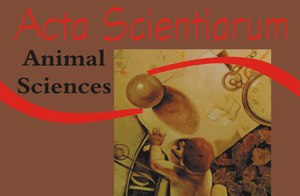Protozoa population, microbial synthesis efficiency and rumen degradability of dry matter and neutral detergent fiber in cattle fed on diets with different lipid rates were evaluated. Nine 16-month-old Nelore young bulls, cannulated in the rumen and duodenum, weighing 232 ± 35 kg, were used in the trial. Experimental design consisted of a 3 x 3 square in triplicate, comprising the following treatments: 2, 4 and 6% lipid in diet. In situ degradability was assessed by rumen incubation of corn silage, soybean, soybean meal and citrus pulp during 0, 3, 6, 12, 24, 48, 72 and 96h. The flow of microbial nitrogen and microbial efficiency were not influenced (p > 0.05) by the inclusion of lipid levels in the diet. When the animals received diet with 4% lipid, there was a reduction (p < 0.05) in the potential and effective degradation of dry matter of corn silage (64.10 and 55.04%, respectively), soybean meal (94.55 and 60.83%, respectively) and soybeans (98.45 and 76.44%, respectively). Since the degradability of neutral detergent fiber was not affected, 4 and 6% lipid levels in the diet may be used without altering the parameters of rumen degradation of fiber.
degradability; fat; microorganisms; ruminants; soybean








